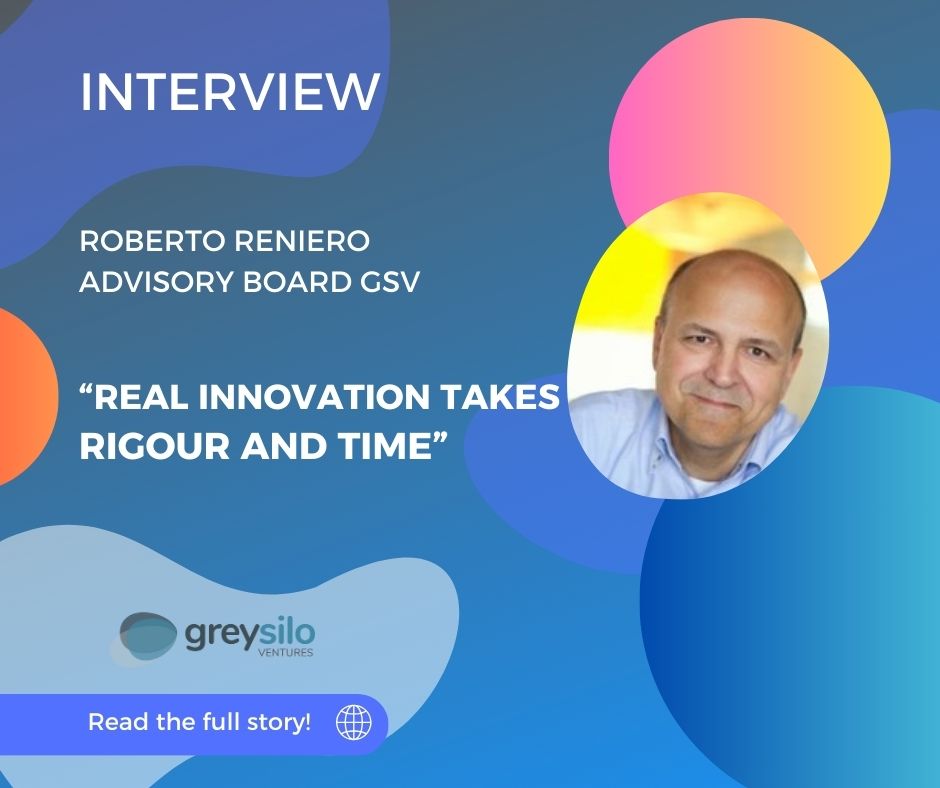
“Real innovation takes rigour and time”. Interview with Roberto Reniero
Picture a world where food is crafted to be genuinely sustainable, where pioneering technology meets age-old agricultural wisdom, and where the next generation of ingredients doesn’t just taste better but also respects people and planet.
This is the vision behind Grey Silo Ventures, the CVC of Cereal Docks Group, now celebrating its third anniversary with a renewed commitment to revolutionizing how we grow, produce, and experience food.
As part of our anniversary series, we’re shining a light on the voices that guide our mission. In this interview, we speak with Roberto Reniero, an accomplished innovator and member of Grey Silo Ventures’ Advisory Board. Having navigated diverse roles across research, product development, and global business, Roberto brings unique insights into the changing landscape of food-tech and ag-tech.
In this interview, he reflects on the lessons learned from his experience in investing in agri-food: from the importance of thoroughly assessing early-stage startups to the necessity of a “people-first” mindset in a rapidly shifting market. He also highlights some of the urgent challenges we face, such as the need for more resilient farming practices and solutions to reduce the roughly 30% of food wasted before it even reaches consumers.
As Roberto reminds us, progress isn’t just about technology; it’s about people: their creativity, their integrity, and their willingness to collaborate. Here, he shares how “people-first” thinking continues to guide our investments and why a rigorous, grounded approach is key to uncovering true innovation. Read on to discover how Grey Silo Ventures is cultivating the future of food, and why the real transformation is just beginning.
- Looking back on the last three years, what stands out as the most significant lesson Grey Silo Ventures has learned about investing in the agri-food sector?
When we started three years ago, we were still in a high investment period compared to today, although signs of deceleration were already evident. The deceleration has turned into a real decline for reasons that have been analyzed in detail elsewhere by various analysts. It was a sign that something wasn’t going quite right. I think the most significant lesson learned by GSV is to take the time to analyze the startup, its funders and members, its structure, and the technology/service proposed in depth, by making the best of its multifunctional board with multiple years of experience in different areas. VC will always be a risky business, but a thorough and pragmatic analysis of what is on the table and how this could probably pan out is a must.
- Innovation in food and ag-tech is evolving rapidly: which emerging trends or technologies do you believe will have the greatest impact on building a more sustainable food system?
Almost every day we hear about a new trend, a new technology, a new idea that promises to change the food system forever, but real innovation takes rigour and time. There are areas we have been talking about for years in which I believe there is still a tremendous amount of work to be done, such as sustainable ingredients to find natural, affordable, and tasty alternative proteins, fats, sugar, etc. Another area, though not new, that will require additional attention is resilient farming. Climate change, erosion of cultivated lands, management of natural resources, aging of farmers, solutions for regenerative agriculture, and many other areas should keep various startups busy for years to come. Finally, we are still short of ideas and solutions to reduce the approximately 30% of food waste occurring between harvest and retail. It is a mind-blowing figure that, for the moment, doesn’t seem to receive enough attention.
- Grey Silo Ventures was founded on a “people-first” vision. How do you see that principle guiding decision-making as you navigate the increasing complexity of the food-tech market?
I believe it must remain our guiding beacon. When evaluating early-stage startups, where it is perfectly acceptable for some pieces to be missing and many questions to remain unanswered, working with knowledgeable, honest, and open-minded people will surely help. Mutual trust and respect will always play a major role in fostering a healthy relationship between people that will embark on different roles in a risky adventure.
- With sustainability and resilience now more critical than ever, what criteria do you use to evaluate startups for both their business potential and their positive social or environmental impact?
I think a lot has already been said in previous answers, but to be more specific on this particular aspect, I think pragmatism should lead this type of evaluation. Would this technology/service fulfill a real market need? Why should a consumer be interested in it? Would it really make a difference to our society, and how would it differ from what already exists? Are there other ways to achieve the same results in a shorter, cheaper, and less troublesome way?
- Three years in, what do you envision for the future of Grey Silo Ventures? Which milestones are you aiming for, and what do you hope to achieve in the next phase of this journey?
Three years is a long time, but it may still be rather short for solid innovative ideas if we want them to be executed with the right attention and rigour. I think we need to continue the journey we have embarked on by providing continuous support to the startups we have invested in, to help them grow successfully. We also need to keep exploring future opportunities within our investment umbrella with pragmatism and rigour. If we do all of this well, there will surely be a lot of work to be done, maybe even more than we think.

